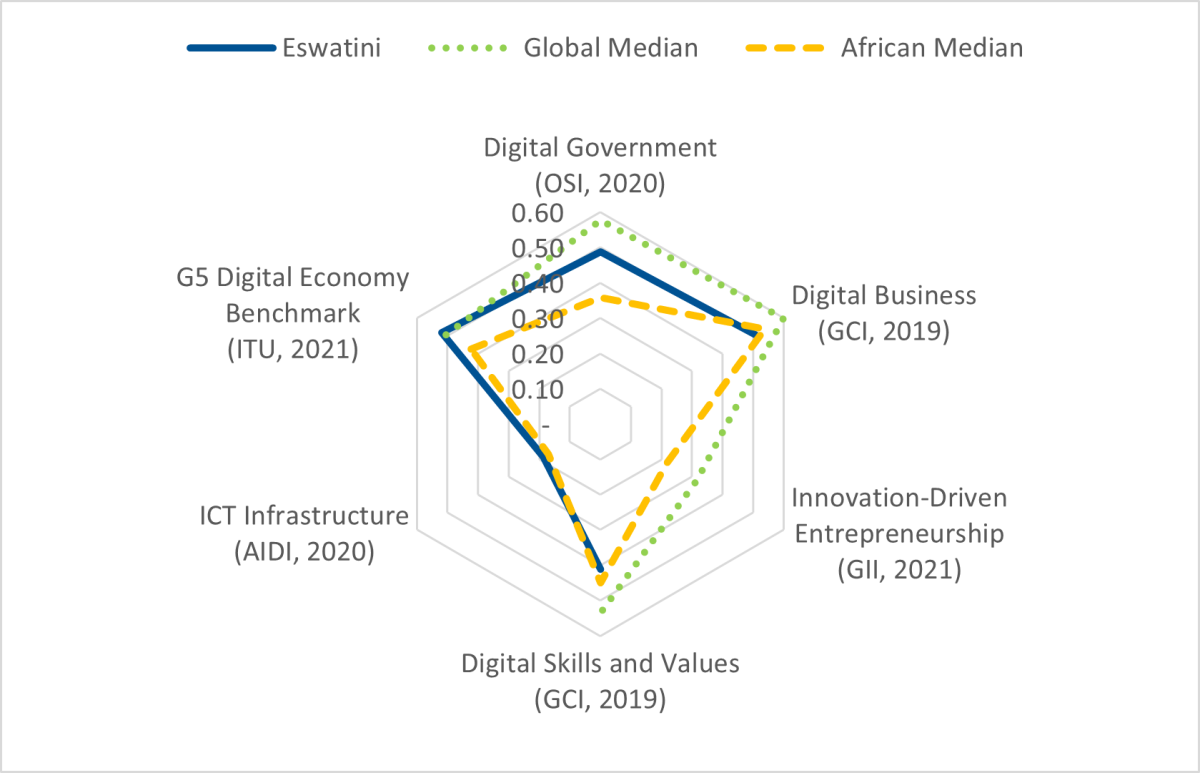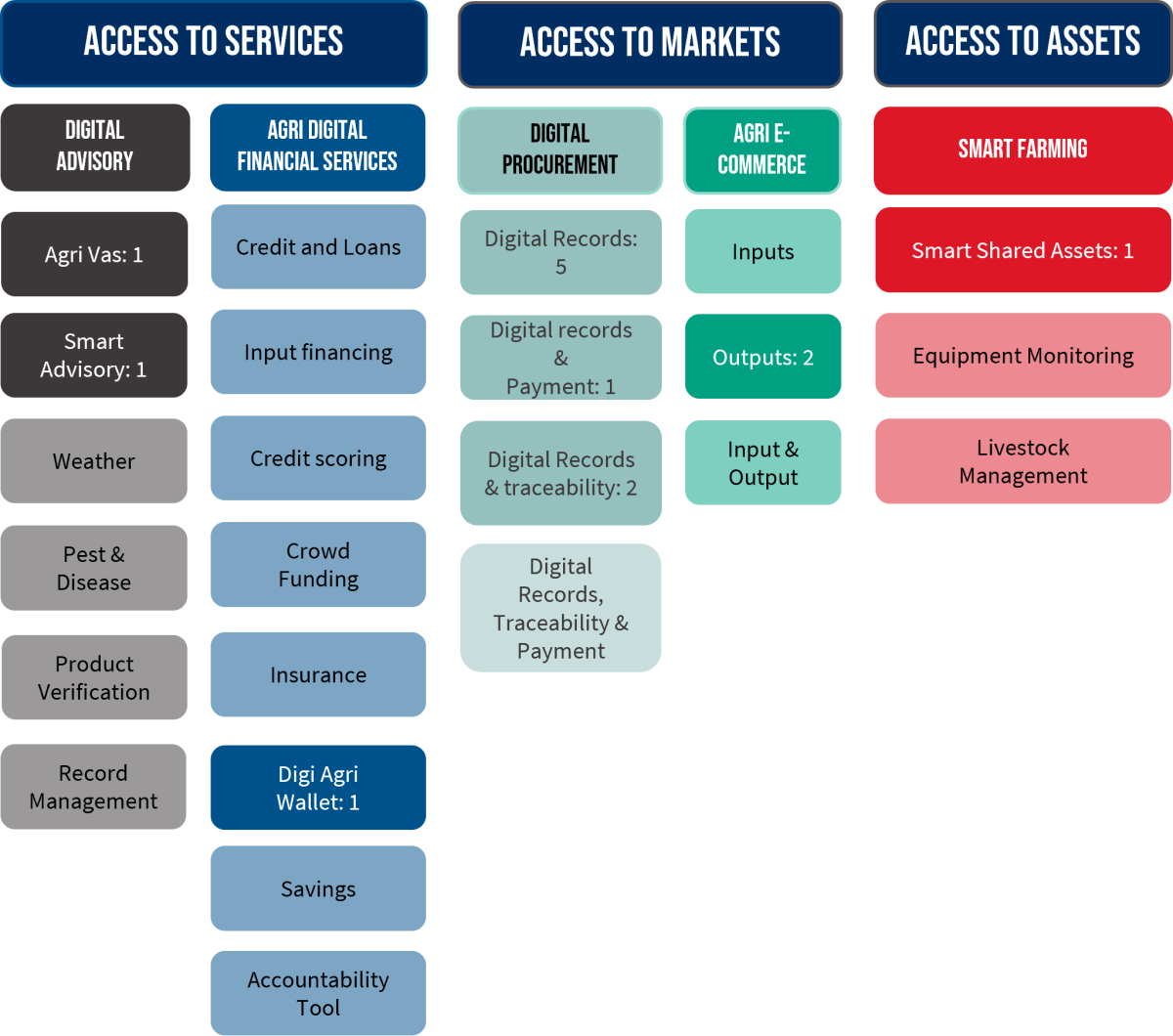Caption: Interactive map presenting country specific data, including universities and incubators contacted for the study and the digital innovations identified at the time of the study
Full Country Report (PDF)
Eswatini Ranked 4 out of 16 Countries in the Benchmark
The benchmark assessment reflects the extent to which Eswatini is unlocking positive pathways towards a digital economy and supporting a vibrant ecosystem of different actors.

Caption: Results from Benchmark Assessment for Eswatini
Eswatini ranked 4 out of 16 in the benchmark assessment which suggests a developing digital economy with some key foundational areas being developed.
Eswatini ranked highest in the G5 benchmark (5) and the ICT infrastructure pillar (7).
| Group | Country | Benchmark Index Score (Adjusted) | Overall Benchmark Ranking |
|---|---|---|---|
| 1 | South Africa | 0.5891 | 1 |
| Mauritius | 0.5839 | 2 | |
| Seychelles | 0.5155 | 3 | |
| Global Median | 0.5064 | ||
| 2 | Eswatini | 0.4222 | 4 |
| Tanzania | 0.4138 | 5 | |
| Botswana | 0.4114 | 6 | |
| 3 | Zimbabwe | 0.3895 | 7 |
| Namibia | 0.3809 | 8 | |
| Lesotho | 0.3802 | 9 | |
| African Median | 0.3595 | ||
| Zambia | 0.3506 | 10 | |
| Malawi | 0.3483 | 11 | |
| Madagascar | 0.3005 | 12 | |
| 4 | Angola | 0.2985 | 13 |
| Mozambique | 0.2919 | 14 | |
| DR Congo | 0.2782 | 15 | |
| Comoros | 0.2497 | 16 |
Caption: Overall Benchmark Assessment Results and Rank for all SADC member states
For further information on the benchmark results and regional trends please read the Situational Analysis Report.
Agriculture is Identified as a Key Priority Sector but Digitalization Has Not Yet Been Integrated in Policies and Strategies
The baseline of national policies and strategies highlighted that digitalization has been prioritized in Eswatini. Key documents were developed that focus on ICT dissemination, the information society, e-Government, and cyber security.
It is unclear to what extent digitalization has been embraced in agricultural systems when observing sectoral policies and national strategies. Agriculture is frequently noted as a key priority sector but there is little evidence of an integration of digitalization in documents.
Policy to promote entrepreneurship and increase access to capital so that solutions can be developed requires implementation. The sector must also prepare and support an environment that will allow for the integration of these innovations such as increasing digital skills, improved connectivity, and increased farmer uptake so that these strategies complement each other and support the overall digital ecosystem.
10 Innovations were Identified in Eswatini with Digital Procurement the Most Common Solution
All use cases were present in Eswatini: digital advisory, Agri-digital financial services, digital procurement, Agri e-commerce and smart farming. The majority addressed digital procurement, and an equal proportion distributed across digital advisory, digital financial services, and e-commerce.

Caption: Diagram illustrating number of identified innovations and their sub use case solutions.
Innovations in Eswatini are more tailored for the earlier stages of the value chain in terms of planning, input, access, use, and on-farm production. There were no solutions for storage or transport found.

Caption: Diagram illustrating number of innovations identified in each phase of the value chain.
The major challenges faced when implementing technologies include low digital literacy levels, lack of mobile coverage, prohibitive cost of data, and a central control of the internet.
Digital Agriculture Training Courses are Limited in Eswatini
Even if digital training was provided by the University, it would be insufficient in providing digital literacy services to assist, empower and grow the ability and capability of individuals at all levels in society. Better support is needed for the development of digital skills for agricultural youth entrepreneurship by advancing capacity building, support in relevant program development and raising resources for support to start-ups.
Building a more integrated ecosystem of cooperation and collaboration between the University and incubator parks to advance digital agricultural curriculum and orient it towards entrepreneurship would be valuable.
A National Research and Education Network (NREN) has not been established by the Kingdom of Eswatini. It is recommended that the NREN development is supported so that it supports the development of affordable connectivity infrastructure and other value-added services for the benefit of research, education, and innovation-related institutions.
Icons - credit to NounProject https://thenounproject.com/






